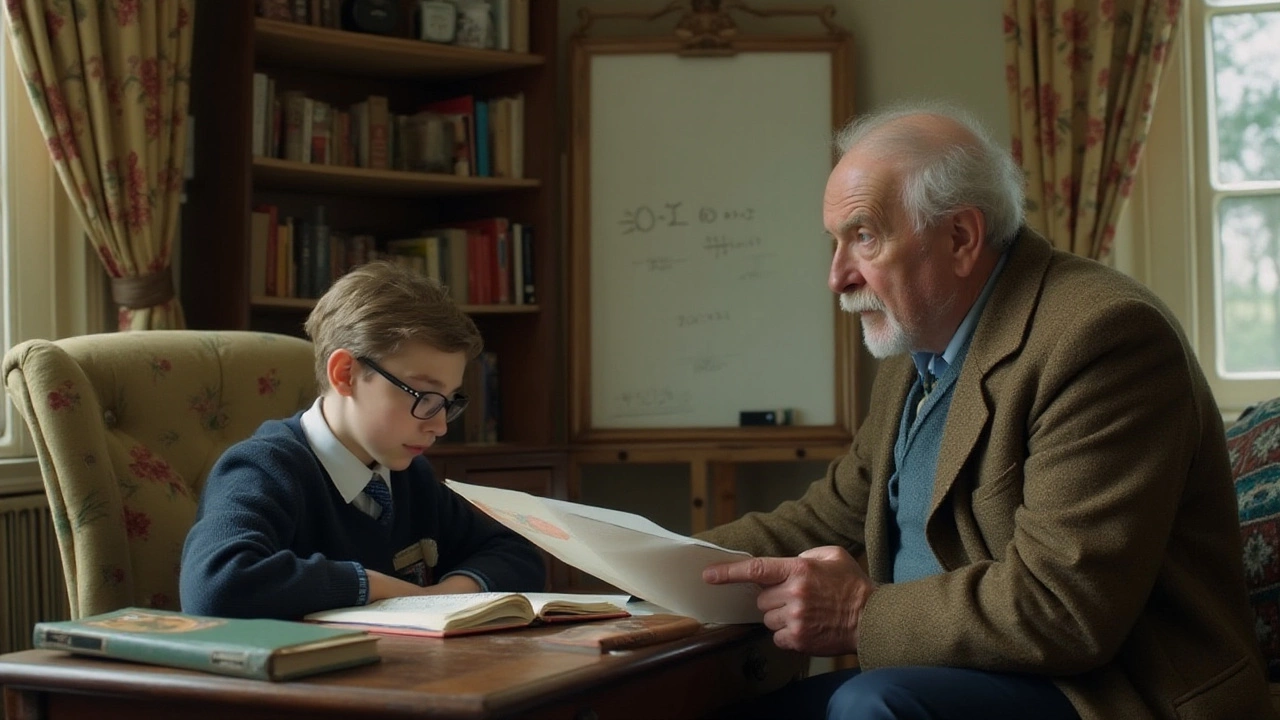In the bustling world of education, private tutoring has emerged as a valuable resource for many learners. Yet, a common question persists: can just one hour of tutoring truly make a difference? This inquiry is more complex than it seems, and the answer is not one-size-fits-all.
From the student's unique learning style to the tutor's approach, numerous variables play a critical role in determining the effectiveness of a short tutoring session. Some students may thrive with concentrated bursts of knowledge, while others might require more extensive guidance.
Understanding these dynamics can help parents, students, and tutors tailor their approach to ensure that every minute spent is both productive and impactful. Whether it's grasping new concepts or improving grades, the goal is to foster an environment where learners can achieve their fullest potential in any given timeframe.
- The Role of Tutoring in Education
- Factors Determining Tutoring Impact
- Maximizing Each Tutoring Hour
- Subject-Specific Tutoring Needs
- Evaluating Progress and Results
The Role of Tutoring in Education
In the realm of education, tutoring serves as a personalized learning approach that caters to the specific needs of students. Traditional classroom settings can sometimes be overwhelming; students might not feel comfortable asking questions or may find it challenging to keep up with the pace of the curriculum. This is where private tutoring steps in, providing individual attention and customized teaching strategies. Tutors can adjust their methods to suit the learning style of each student, whether they are visual, auditory, or kinesthetic learners. By doing so, tutors make learning engaging and ensure that the concepts are understood deeply, not just memorized for short-term recall.
The impact of tutoring extends beyond academic performance. According to a study by the National Bureau of Economic Research, students who receive regular tutoring sessions are often more confident and have higher self-esteem when tackling academic challenges. A tutor's role is not just to teach but to act as a mentor, encouraging students to develop a love for learning and become independent thinkers. This support is especially crucial during formative years, where academic achievement can shape future opportunities. If executed effectively, tutoring can bridge the gap between potential and performance, empowering students to excel.
Moreover, a successful tutoring relationship requires synergy between the student and the tutor. As each student brings their own set of challenges and strengths, tutors need to be astute in identifying these and adapting their strategies accordingly. For instance, in mathematics, a subject often dreaded by many, targeted tutoring has been found to effectively address specific problem areas like algebraic concepts or geometry proofs. Research shows that students who receive personalized help in such focused subjects show improved test scores by up to 40%. This targeted approach makes tutoring a crucial component in a student's educational journey.
For parents skeptical about the investment in private tutoring, understanding its potential benefits is key. It's not merely about improving grades but fostering an environment that promotes curiosity and intellectual growth. According to educational expert Dr. Linda Darling-Hammond, "Good tutoring is not merely about transmitting knowledge; it's about nurturing the ability to learn." A well-structured tutoring program can fundamentally change how a student perceives learning, converting it from a task to a lifelong passion.
The continuous rise of technology also plays a role in shaping tutoring methods and accessibility. With the advent of online tutoring platforms, students can now access quality education regardless of geographical barriers. This digital revolution in education has broadened the horizons, allowing more students to benefit from expert guidance and proven educational resources, making tutoring an even more significant pillar in modern education.
Factors Determining Tutoring Impact
The effectiveness of a tutoring session, especially when limited to just one hour, is influenced by a myriad of factors that work together to shape the educational experience. Among these factors, the student's individual needs stand out prominently. Every learner brings a unique set of strengths, weaknesses, and learning styles to the table, which are crucial in tailoring the tutoring approach. For some students, a focused hour with an experienced tutor can mean the difference between confusion and clarity in subjects like mathematics or science. The tutor must recognize these learning styles whether it’s visual, auditory, or kinesthetic, adapting their methods accordingly.
Another essential factor is the complexity of the subject material. Tutoring in a more conceptual subject like literature requires different strategies compared to more formulaic subjects like algebra. The tutor’s ability to distill complex ideas into digestible chunks largely influences the effectiveness of shorter sessions. In many cases, tutors who bring creativity and enthusiasm into their sessions can facilitate breakthroughs that foster both understanding and interest in the subject matter. This was aptly put by educational researcher Dr. Eleanor Whitehead, who noted,
“Engagement is half the battle won; when students are engaged, even a single hour can unlock potential.”
Additionally, the experience and skills of the tutor themselves play a crucial role. A well-trained tutor who can quickly assess a student's needs and adjust their session plans can make effective use of limited time. They can often identify key areas where the student requires support, using diagnostic assessments at the beginning of the session. These assessments help in customizing the learning experience to focus on priority areas. In contrast, less experienced tutors might struggle to manage their time efficiently, leading to unproductive sessions.
Moreover, the frequency and consistency of tutoring sessions cannot be overlooked. A single hour a week versus multiple shorter sessions throughout the week can yield different outcomes. Evidence suggests that recurring exposure to educational content can lead to better retention and understanding. This touches on the importance of establishing a routine that correlates with the student’s schedule and learning pace. Successful tutors often encourage students to maintain notes or a journal of what they learn during these sessions to help reinforce the material. Tutoring impact is maximized when students are empowered to take control of their learning and practice independently.
Finally, the environment where tutoring takes place should be conducive to learning. A quiet, organized, and comfortable space can significantly elevate the efficacy of tutoring. This atmosphere minimizes distractions, allowing for focused study. Tutors may bring along materials that align with the student’s curriculum, enhancing the alignment between tutoring and the school's goals. With all these factors considered, it becomes clear that while the length of a tutoring session is important, the quality of the interaction and adaptability to the student’s needs are equally crucial in determining its success.
Considering these factors, it is evident that a one-hour tutoring session can be incredibly effective when approached with these dynamics in mind. By ensuring that sessions are tailored to the student's individual needs and learning environment, tutors can help students maximize their potential, making even the shortest interactions productive and meaningful.

Maximizing Each Tutoring Hour
Getting the most out of a tutoring session, especially when it's limited to just an hour, requires strategic planning and focused execution. This brief period must be approached with clear objectives and efficient use of time to enhance academic success. One of the first steps to ensuring productivity is setting specific and achievable goals before each session begins. Both the student and the tutor need to collaborate on what they aim to accomplish during this short span. By pinpointing areas of difficulty and focusing exclusively on those, the session can target learning gaps in a structured way, avoiding the pitfalls of trying to cover too broad a range of topics.
Having an agenda or a lesson plan in place can steer the session and keep it on track. Tutors should prepare thoroughly by reviewing past assignments, tests, or any specific content that the student has struggled with. This allows them to customize their teaching methods to the student's unique learning style. Incorporating diverse teaching techniques—such as visual aids, practice exercises, and problem-solving activities—can cater to different learning preferences, making the session more engaging and effective. It's crucial to remember that variety within the lesson keeps the student's interest alive, preventing boredom and boosting retention of information.
"Tutoring is not just about learning facts; it involves teaching a student how to think and solve problems. When that’s accomplished, even one hour can be transformative," remarks Dr. Heather Watson, a leading educator and author in the field of personalized learning.
Breaking down information into smaller segments and using repetitions helps reinforce learning. Tutors can encourage active participation by asking questions and prompting students to explain concepts in their own words. This not only checks understanding but also builds confidence. Regular feedback and positive reinforcement during the session can enhance motivation and keep the student engaged in the learning process. With these techniques, even a single hour can be highly productive, ensuring that students walk away with new insights and a better grasp of the subject matter.
Another effective way to maximize the tutoring session is by leveraging technology. Online platforms and educational apps provide interactive resources that can supplement traditional tutoring methods, offering an expansive range of material from practice quizzes to video lessons. They also enable tutors to assign homework or additional practice materials that the student can complete independently, extending learning beyond the tutoring hour.
Finally, evaluating the session's success is key to continuous improvement. After each session, a brief review of the topics covered can reinforce learning and highlight areas that require further attention. This also permits the tutor and student to adjust future plans to better cater to the student's evolving educational needs. By continuously assessing what strategies work best, each session becomes a stepping stone towards higher education goals, making the most of every minute spent together.
Subject-Specific Tutoring Needs
There is a unique set of demands that each subject places on a student, which can greatly influence the effectiveness of a tutoring session. These demands necessitate a thorough understanding of not only the subject matter but also the methodologies best suited for teaching it. For instance, subjects like mathematics often require practice-based learning, where students need to work through various problems to grasp fundamental concepts. In contrast, subjects such as history might benefit from discussion-based sessions that prioritize critical thinking and analysis. The distinction between these subjects underscores the importance of tailoring tutoring approaches to meet specific educational needs.
Science subjects, particularly those that involve laboratory components, often require a tutor to leverage practical examples to bridge the gap between theory and practice. Real-world applications help students appreciate the relevance of what they are learning, turning abstract concepts into tangible understanding. Meanwhile, language subjects tend to focus on immersive experiences that enhance fluency and comprehension through conversation, reading, and writing exercises. By understanding the innate needs of each subject, a tutor can create a more engaging and effective learning experience, which is critical for the student's academic success.
Research suggests that customizing tutoring strategies for different subjects can significantly boost student performance. According to the National Tutoring Association, "The key to successful tutoring is adapting to each student's learning style while maintaining subject integrity". This highlights the importance of flexibility and individuality in tutoring, essential components to meet diverse learning objectives.
Moreover, assessing a student's progress in different subjects requires varied approaches as well. Quantitative subjects like science and math might rely more heavily on test scores and practice problem sets as measures of success, while qualitative subjects like literature and social studies may look at essays and project presentations to gauge understanding. The right tutor will know which metrics are most meaningful for assessing growth and will adjust their tactics accordingly to ensure the private tutoring arrangement is as effective as possible. This intentional focus not only aids current learning but sets a strong foundation for future educational pursuits and lifelong learning skills.
Understanding these subject-specific needs allows for the development of personalized tutoring programs that can address weaknesses and reinforce strengths. It is an investment in education that can pay dividends, providing not only the immediate benefit of improved grades but also fostering a deeper love for learning. This appreciation of each subject's uniqueness and the student’s response to it is what ultimately makes one hour of tutoring not just enough, but potentially transformative.

Evaluating Progress and Results
It's essential to reflect on the tutoring sessions to determine their true impact. When we delve into the progress and results, the first step is to measure the tangible outcomes like improvements in grades and scores. Students should maintain a record of their performance before and after engaging with a tutor. This will shed light on whether the strategies employed during tutoring are effective or need adjustments.
Besides academic scores, increased confidence in subject matter is a qualitative measure of success in private tutoring. Often, parents and educators notice a positive shift in attitude towards learning, which is an invaluable aspect of the educational journey. Regular feedback sessions with tutors can help hone in on areas that have seen improvement and aspects that might still pose challenges. Tutors can employ diverse evaluation methods, such as quizzes, oral tests, and problem-solving tasks to assess the student's understanding on a deeper level.
Gauging Holistic Development
Academic improvement is one facet of progress. It’s equally important to evaluate personal and skill development. For example, increased motivation, better time management, and enhanced problem-solving skills directly influence a student's ability to succeed both in academics and in life. A worthwhile tutoring program will aim at nurturing these critical skills. A study by the National Tutoring Association highlighted that students participating in regular tutoring sessions tend to showcase improved organizational skills.
"Reflecting on your child's comfort with the teacher-student dynamic is paramount," suggests Clara Bolton, a seasoned educator and writer, who published an insightful piece on tutoring efficacy.
Open communication with the student about their comfort levels and satisfaction with the tutoring arrangement helps in creating an adaptable learning environment. This adaptability is crucial for students at different levels of understanding and with varied learning needs.
Using Data and Feedback for Enhancement
Employing both qualitative and quantitative assessments gives a well-rounded picture of a student's development. Schools and educators often collaborate to analyze the cumulative data, providing insights for optimizing tutoring strategies. Some tutors go the extra mile by incorporating educational technology tools that capture real-time data and progress tracking. Students benefit from visual cues like graphs and progress charts available through these platforms, making the learning process transparent and motivating.
Ultimately, the goal is to create a feedback loop where students, tutors, and parents work cohesively to achieve educational success. With structured and continual evaluations, it’s possible to ensure that every hour spent in private tutoring becomes a stepping stone towards meaningful achievement.

